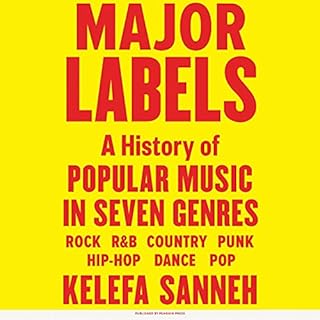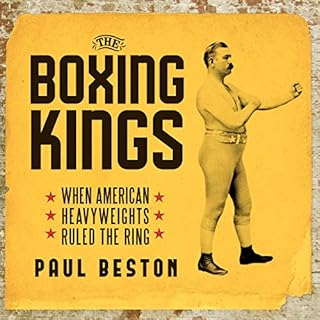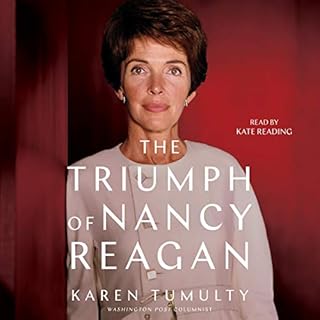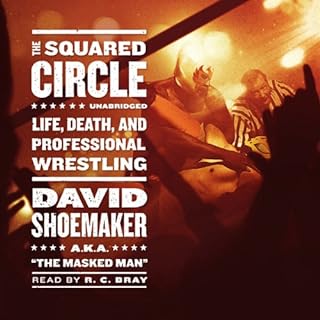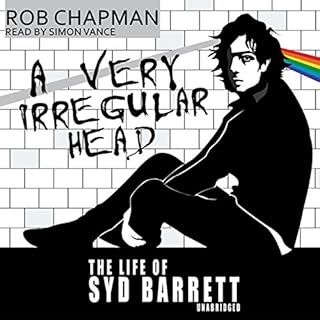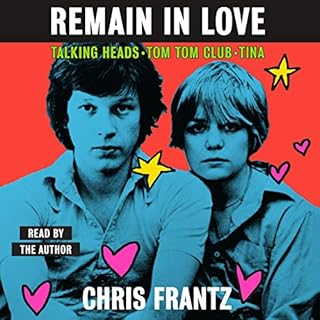Keith
- 42
- reviews
- 450
- helpful votes
- 322
- ratings
-
Madonna
- A Rebel Life
- By: Mary Gabriel
- Narrated by: Elise Arsenault
- Length: 41 hrs and 43 mins
- Unabridged
-
Overall4 out of 5 stars 68
-
Performance4 out of 5 stars 62
-
Story4 out of 5 stars 62
With her arrival on the music scene in the early 1980s, Madonna generated nothing short of an explosion—taking the nation by storm with her liberated politics and breathtaking talent. But Madonna was more than just a pop star. Everywhere, fans gravitated to her as an emblem of a new age, one in which feminism could shed the buttoned-down demeanor of the 1970s and feel relevant to a new generation. Deftly tracing Madonna’s story from her roots to her rise to super-stardom, master biographer Mary Gabriel captures the dramatic life and achievements of one of the greatest artists of our time.
-
1 out of 5 stars
-
Narrator unbearable
- By Gina ihms on 10-13-23
- Madonna
- A Rebel Life
- By: Mary Gabriel
- Narrated by: Elise Arsenault
Mixed Bag
Reviewed: 10-22-23
I was excited about the prospect of Mary Gabriel writing a thorough biography of Madonna because her previous book Ninth Street Women is incredible. I was expecting her to do justice to Madonna by conducting thorough research, writing with a serious tone, and placing her subject within a broader framework of feminism and fine art traditions. Unfortunately, the final product is not as strong as I had hoped. It's not without merits, but there are some noted drawbacks. Here are some pros and cons from my perspective:
Pros:
- Gabriel does a great job in placing Madonna's life and career in conversation with feminist theory and fine art. Ultimately, the book goes out of its way to make the claim that Madonna is best seen as an artist, not an entertainer.
- The work on friends and collaborators outside of the realm of music help to situate the Madonna-as-artist argument. It's clear that Gabriel is most knowledgable and comfortable writing about the New York art scene. These sections of the book are fantastic, particularly the early chapters about New York. Gabriel writes vividly about the city and provides heartbreaking context for the sea change which followed the arrival of HIV/AIDS.
Cons
- Gabriel does a poor job writing about music. I understand that she's trying to argue that Madonna is much more than a pop star, but the failure to understand that music is her primary creative practice is deeply frustrating. Gabriel relishes opportunities to discuss Madonna's film work, videos, award show appearances, and concerts, often in excruciating detail, but glosses over the recording and sonic qualities of her most iconic songs and albums. Gabriel has a contrarian streak and seeks to answer detractors by arguing for the importance of later work by giving more detail about the recording of albums made since the mid-90s, but the first four albums are glossed over so much that it gives the impression that Gabriel finds peak Madonna uninteresting and embarrassingly mainstream. My big takeaways from the book are that Gabriel has limited knowledge about music and poor personal taste. She doesn't seem to understand why Madonna's records transcended the 1980s pop landscape, while at the same time she overvalues the work of cringe collaborators from the 1990s and 2000s.
- For a subject who defined her career through collaboration, it's perplexing that Gabriel never thought to tackle this project with a co-author. This is a book in desperate need of another voice to fill in the massive gaps in Gabriel's knowledge and expand the book beyond her limited perspective.
- The book slips into the territory of tabloid gossip far too often. On numerous occasions she cites the trashy celebrity biographer J. Randy Taraborrelli without contextualizing or speaking back to this dubious source. In tone and research, I expected better from Gabriel.
- The audiobook narration is not great. Mangled pronunciations litter the reading and the overall tone is just off. That said, the writing itself is not on par with Gabriel's previous book and many of her passages would be hard for any narrator to bring to life. There is so much dry overview of well known events that is simply unnecessary. It's as if Gabriel is writing for a reader a century from now who requires basic summaries of topics like the 2016 election. Cut that out and the book could either be 10 hours shorter in run time, or, better yet, that time could be spent digging deeper into Madonna's music. This is Gabriel's first book about a contemporary topic, but she uses the same stylistic approach as previous books. It's quite often a painful read because Gabriel refused to make necessary adjustments to account for the reader's knowledge.
It's a useful book in many ways and helped me get excited for seeing the Celebration Tour, but I was hoping for so much more.
Something went wrong. Please try again in a few minutes.
You voted on this review!
You reported this review!
1 person found this helpful
-
Major Labels
- A History of Popular Music in Seven Genres
- By: Kelefa Sanneh
- Narrated by: Kelefa Sanneh
- Length: 18 hrs and 59 mins
- Unabridged
-
Overall4.5 out of 5 stars 147
-
Performance5 out of 5 stars 120
-
Story4.5 out of 5 stars 119
Kelefa Sanneh, one of the essential voices of our time on music and culture, has made a deep study of how popular music unites and divides us, charting the way genres become communities. In Major Labels, Sanneh distills a career’s worth of knowledge about music and musicians into a brilliant and omnivorous reckoning with popular music - as an art form (actually, a bunch of art forms), as a cultural and economic force, and as a tool that we use to build our identities.
-
5 out of 5 stars
-
Pure Pleasure Cultural History
- By A. Yerkes on 11-09-21
- Major Labels
- A History of Popular Music in Seven Genres
- By: Kelefa Sanneh
- Narrated by: Kelefa Sanneh
Wildly Uneven and Overly Broad
Reviewed: 10-23-22
The frustrating nature of the book is mostly due to Sanneh's attempt to write a history of American popular music in a single volume. While he tries on occasion, it is impossible to add much depth or detail when covering so much ground. Instead, the very design of the project pushes his writing into broad generalizations and passing references to major (and some minor) figures. There are some insightful moments here and there, but too few to justify the glowing praise for the book. Structurally, the book is a mess, with Sanneh seemingly confusing himself as he jumps back and forth chronologically and imposing awkward groupings by breaking up his chapters into a series of subtopics. Ultimately, the book works best when it deviates from trying to function as a history and instead focuses on Sanneh's evolving personal relationship with various genres. His chapters on punk and dance music have much more granular detail and compelling commentary than the rest of the book largely because of the author's personal investment in the genres. Still, both chapters have gaping holes and primarily stick to the eras in which Sanneh was an active listener. The chapters on pop and hip-hop have their moments, but it is clear that he has less of a personal investment. The other three chapters of the book, however, are mostly useless to anyone with even a passing knowledge of popular music. The rock chapter is laughably broad and undercooked, reading like a high school textbook. While he professes his love for the genre, it is clear that Sanneh only has a casual interest in country music and simply summarizes major talking points. The R&B chapter is the absolute low point of the book, with Sanneh showing that he is completely out of his depth by demonstrating almost zero knowledge about the genre. This chapter is embarrassing. Throughout the book, his writing often serves as a lit review, summarizing points made elsewhere which will be familiar to many readers. Perhaps this book is meant to be one stop shopping for the reader, saving them time from working through a beginner's bibliography of popular music criticism. He relies too heavily on certain voices, such as Nelson George, whom he labels as a "historian," which is both funny and telling of the limitations to be expected from Sanneh. Lastly, the book reinforces an old adage. Question: How do you know if someone went to Harvard? Answer: Wait two minutes and they'll work it into the conversation.
Something went wrong. Please try again in a few minutes.
You voted on this review!
You reported this review!
2 people found this helpful
-
The Boxing Kings
- When American Heavyweights Ruled the Ring
- By: Paul Beston
- Narrated by: Alexander Cendese
- Length: 13 hrs and 15 mins
- Unabridged
-
Overall5 out of 5 stars 152
-
Performance5 out of 5 stars 128
-
Story5 out of 5 stars 128
The Boxing Kings tells the story of the heavyweight title in the days when it was a defining institution in the United States. Author Paul Beston places special emphasis on those champions who held a central place in American culture beyond just in the boxing ring, including John L. Sullivan, who made the title a commercial property; Jack Johnson, who in 1908 became the first black man to claim the title; Joe Louis, whose contributions to racial tolerance and social progress transcended even his greatness in the ring; and many more.
-
5 out of 5 stars
-
An outstanding book on heavyweight champions
- By LSmith on 02-01-18
- The Boxing Kings
- When American Heavyweights Ruled the Ring
- By: Paul Beston
- Narrated by: Alexander Cendese
Simplistic history with right-wing asides
Reviewed: 10-10-22
Perhaps this book is useful as a beginner's history of the heavyweight division, but any readers with even a passing knowledge of the lineage from Sullivan to Tyson will find themselves bored. There are countless books covering the same figures and history, most of them superior in style and authorial knowledge. I'll take Bert Sugar any day over Beston, whose only distinguishing feature is peppering the text with problematic conservative talking points. At times this book is the equivalent of an hour spent on Wikipedia tracing the heavyweight belt. It is basic, broad, and lacks authority. At other times it reads like a poor man's version of George F. Will's forays into sports commentary, lacking the dandy prose or intellectual rigor of Will. I didn't know anything about Beston before starting the book, but his comments sent me searching for answers. It was unsurprising to find that he works for a conservative think tank. Buyer beware.
Something went wrong. Please try again in a few minutes.
You voted on this review!
You reported this review!
-
The Triumph of Nancy Reagan
- By: Karen Tumulty
- Narrated by: Kate Reading
- Length: 25 hrs and 20 mins
- Unabridged
-
Overall4.5 out of 5 stars 75
-
Performance4.5 out of 5 stars 70
-
Story5 out of 5 stars 69
This book explores the multifaceted character of Nancy Reagan and reveals new details surrounding the tumultuous presidency. The Washington Post columnist Karen Tumulty spent four years interviewing the people who knew this couple best and draws on overlooked archives, letters, memoirs, and White House records, compiling the most extensive biography of Nancy Reagan yet. From the AIDS epidemic to tensions with the Soviets and the War on Drugs, this book shows how Nancy Reagan became one of the most influential First Ladies of the century.
-
5 out of 5 stars
-
A poignant and rich biography—well worth the time!
- By Amazon Customer on 04-26-21
- The Triumph of Nancy Reagan
- By: Karen Tumulty
- Narrated by: Kate Reading
Solid biography, but not groundbreaking
Reviewed: 05-03-21
The tendency with most biographies of first ladies is to simply see them as appendages of their powerful husbands. Tumulty struggles with this throughout and never seems to choose whether she thinks of Nancy Reagan as her own entity or simply an extension of her husband. Clearly, her persona was wrapped up in playing the role of the supportive wife, but the content of her character both behind the scenes and in her public appearances showed a woman who was much more than a dutiful spouse. While the book provides good background information on Nancy prior to her arrival in Hollywood and a thoughtful consideration of her role as a shepherd of her husband's legacy in the post-White House years, she gets lost for large swaths of the book as Tumulty provides overviews of key events in Ronald Reagan's life. Essentially, this is a book that is more about Ronald Reagan than it is about Nancy Reagan.
The narration is largely good, but with some recurring issues. Perhaps it's an impossible task to find a reader with a solid background in both world affairs and Hollywood history, but there are a number of clunky pronunciations of key figures throughout.
Something went wrong. Please try again in a few minutes.
You voted on this review!
You reported this review!
-
Places of Mind
- A Life of Edward Said
- By: Timothy Brennan
- Narrated by: Timothy Andrés Pabon
- Length: 15 hrs and 47 mins
- Unabridged
-
Overall5 out of 5 stars 23
-
Performance4.5 out of 5 stars 17
-
Story4.5 out of 5 stars 18
As someone who studied under Edward Said and remained a friend until his death in 2003, Timothy Brennan had unprecedented access to his thesis adviser's ideas and legacy. In this authoritative work, Said, the pioneer of postcolonial studies, a tireless champion for his native Palestine, and an erudite literary critic, emerges as a self-doubting, tender, eloquent advocate of literature's dramatic effects on politics and civic life.
-
5 out of 5 stars
-
Promise and peril of being a public intellectual
- By Keith on 04-17-21
- Places of Mind
- A Life of Edward Said
- By: Timothy Brennan
- Narrated by: Timothy Andrés Pabon
Promise and peril of being a public intellectual
Reviewed: 04-17-21
Brennan's biography of Edward Said is written through the prism of a former student's deep admiration for his mentor, yet it remains critical of his subject's ideas and motivations. Far from the exhaustive warts-and-all biography that is often the result of a writer becoming immersed in personal papers and extensive interviews, Brennan remains focused on Said's ideas. For the most part, Brennan dedicates himself to explaining and analyzing the cultural, political, and historical context which shaped Said's published work, not his private life. Dealing with the political complications of the Middle East throughout, Brennan also uses Said's story to chart the broader trajectory of academia since the 1960s. In doing so he asks critical questions about intellectual freedom, political efficacy, and the minefields that public intellectuals must navigate. The institutional history found here regarding Columbia University is especially informative. This book helps explain both Said's lasting influence and the ways in which his work continues to generate divided responses both in and out of the academy.
Something went wrong. Please try again in a few minutes.
You voted on this review!
You reported this review!
1 person found this helpful
-
Lady Bird Johnson: Hiding in Plain Sight
- By: Julia Sweig
- Narrated by: Kirsten Potter
- Length: 18 hrs and 1 min
- Unabridged
-
Overall4.5 out of 5 stars 195
-
Performance4.5 out of 5 stars 167
-
Story4.5 out of 5 stars 166
In the spring of 1964, President Lyndon B. Johnson had a decision to make. Just months after moving into the White House under the worst of circumstances - following the assassination of President John F. Kennedy - he had to decide whether to run to win the presidency in his own right. He turned to his most reliable, trusted political strategist: His wife, Lady Bird Johnson.
-
3 out of 5 stars
-
Fine, but lacking an intervention
- By Keith on 03-22-21
- Lady Bird Johnson: Hiding in Plain Sight
- By: Julia Sweig
- Narrated by: Kirsten Potter
Fine, but lacking an intervention
Reviewed: 03-22-21
This is an odd book in a lot of ways. Instead of a straightforward biography of Lady Bird, of which good ones already exist, Sweig gives a detailed account of the "other" LBJ's time as first lady. While there's nothing wrong with this approach, it requires a good deal of background information to fill in gaps and provide needed context and backstory. This book is probably most useful for someone who has read Caro or Dallek, but has yet to read a biography dedicated to Lady Bird. The strength of this book is in Sweig's analysis, which is serious and insightful, but the supposed intervention falls flat. First, Sweig's basic premise is that Lady Bird was much more than a sweet and genteel proponent of "beautification." Instead, she was an active and informed voice who helped shape both domestic and foreign policy. While this is certainly true, the case has already been made elsewhere, namely in Betty Boyd Caroli's biography of Lady Bird. Second, through the fragmented structure of the book, over-explaining of commonly understood events, and heavy reliance on already published journal entries, Sweig simply does not make a compelling case. Frankly, it's an easy case to make, but it gets lost in the shuffle. The early chapters are deeply frustrating, although the book does eventually find more even footing. Still, it never reads as an essential addition to many volumes detailing the political lives of the LBJs.
The narration also takes awhile to find its footing. The early chapters use caricatured performance of quotations, but the voice assigned to Lady Bird becomes more restrained and palatable as the audiobook progresses.
Something went wrong. Please try again in a few minutes.
You voted on this review!
You reported this review!
14 people found this helpful
-
The Squared Circle
- Life, Death, and Professional Wrestling
- By: David Shoemaker
- Narrated by: R.C. Bray
- Length: 10 hrs and 55 mins
- Unabridged
-
Overall4.5 out of 5 stars 611
-
Performance4 out of 5 stars 552
-
Story4.5 out of 5 stars 549
A breakthroughexamination of professional wrestling - its history, its fans, and its widercultural impact - that does for the sport what Chuck Klosterman did for heavymetal
The Squared Circle grows out of David Shoemaker'swriting for both Deadspin, where hestarted the column "Dead Wrestler of the Week" - a feature on the many wrestlingsuperstars who died too young because of the abuse they subjected their bodiesto - and Grantland,where he covers the pro-wrestling world and its place in the pop culturemainstream. Shoemaker's sports writing has since struck a nerve withgenerations of wrestling fans who, like him, grew up worshiping a sport oftenderided as "fake" in the wider culture. To them, these professional wrestlingsuperstars are not just heroes but an emotional outlet and the lens throughwhich they learned to see the world.
Starting in the early 1900s and exploring the path of prowrestling in America through the present day, The Squared Circle is thefirst book to acknowledge both the sport's broader significance and wrestlingfans' keen intellect and sense of irony. Divided into eras, each section offersa snapshot of the wrestling world, profiles some of the period's preeminentwrestlers, and examines the sport's influence on our broader culture. Throughthe brawling, bombast, and bloodletting, Shoemaker argues that pro wrestlingcan teach us about the nature of performance, audience, and, yes, art.
Full of unknown history, humor, and self-deprecatingreminiscence - but also offering a compelling look at the sport's rightful placein pop culture - The Squared Circle is the book that legions of wrestlingfans have been waiting for. In it, Shoemaker teaches us to look past thespandex and body slams to see an art form that can explain the world.
-
4 out of 5 stars
-
Good stories, bad editing
- By Andrew B on 06-13-16
- The Squared Circle
- Life, Death, and Professional Wrestling
- By: David Shoemaker
- Narrated by: R.C. Bray
Who is the intended reader?
Reviewed: 03-14-21
This is one of the laziest and most curious wrestling books I’ve come across, which is saying something. Laid out as a sprawling history for a reader wholly uninitiated in the world of professional wrestling, the sheer amount of names along with a ridiculously fragmented narrative make the project both unpleasant and nonsensical. For a reader with even a casual interest in the subject, Shoemaker is repackaging the most obvious and well known stories imaginable. Essentially, this book reads like a series of Wikipedia entries arbitrarily strung together. The “research” is beyond lazy, with Shoemaker actually citing Wikipedia on multiple occasions. This is an awful read from a faux journalist who filters the entire book through his own surface understanding (and sense of superiority over) the topic. Avoid this book.
Something went wrong. Please try again in a few minutes.
You voted on this review!
You reported this review!
-
A Very Irregular Head
- The Life of Syd Barrett
- By: Rob Chapman
- Narrated by: Simon Vance
- Length: 13 hrs and 40 mins
- Unabridged
-
Overall4.5 out of 5 stars 252
-
Performance4.5 out of 5 stars 222
-
Story4.5 out of 5 stars 219
Roger Keith “Syd” Barrett was the definition of a golden boy. With good looks and an aptitude for music, he was a charismatic child who fast became a teenage leader in 1960s England. Along with three school chums - Roger Waters, Richard Wright, and Nick Mason - he formed what would become Pink Floyd.
-
5 out of 5 stars
-
Very Touching
- By Ajit on 05-01-17
- A Very Irregular Head
- The Life of Syd Barrett
- By: Rob Chapman
- Narrated by: Simon Vance
Valiant effort at an almost impossible biography
Reviewed: 01-02-21
Chapman's book is thoughtful, articulate, and thoroughly researched. It is often illuminating and serves as a needed corrective to the mythologies surrounding Syd Barrett's life in and out of the public eye. Still, the book struggles with the very nature of the project, as Barrett's three decades of isolation and penchant for destroying journals and paintings leave a biographer with little to work with. Chapman fills the void with developed analysis of Barrett's songs, detailed contextualizing of England in the 1960s, and an exhaustive summary of Barrett's literary, artistic, and intellectual inspirations. While Chapman's analysis is interesting and insightful, he largely talks around his subject due to the impenetrable nature of Barrett. I can't imagine that there will ever be a better Barrett biography than this, but the ongoing fascination with Syd is tied to an interiority that no writer will ever be able to access.
Something went wrong. Please try again in a few minutes.
You voted on this review!
You reported this review!
-
How the Internet Happened
- By: Brian McCullough
- Narrated by: Timothy Andrés Pabon
- Length: 13 hrs and 29 mins
- Unabridged
-
Overall4.5 out of 5 stars 1,345
-
Performance4.5 out of 5 stars 1,150
-
Story4.5 out of 5 stars 1,148
The Internet was never intended for you, opines Brian McCullough in this lively narrative of an era that utterly transformed everything we thought we knew about technology. In How the Internet Happened, he chronicles the whole fascinating story for the first time, beginning in a dusty Illinois basement in 1993, when a group of college kids set off a once-in-an-epoch revolution with what would become the first "dotcom".
-
3 out of 5 stars
-
Critically empty history
- By Keith on 12-19-20
- How the Internet Happened
- By: Brian McCullough
- Narrated by: Timothy Andrés Pabon
Critically empty history
Reviewed: 12-19-20
McCullough provides a solid overview of key technologies, trends, and companies in the first two decades of the internet age. The book is most useful for readers who were either too young or disconnected from technology in the 1990s and 2000s to have experienced much of this history firsthand as users. As for those of us intimately familiar with dial up connections, the book largely serves as an easily digestible trip down memory lane that doesn't provide much in the way of new information. As well laid out as the book is, McCullough has a troubling tendency to write this history as a utopian triumph. His prose shares the tone of an Epcot attraction in its uncomplicated celebration of new technologies. Rarely does he ask critical questions about the broader costs inherent in the success stories of AOL, Facebook, Google, and Apple. If we should understand the history of automobiles as a devil's bargain where the benefits of modern transportation are countered by climate change and urban sprawl, a history of the Internet Age must consider the tradeoffs that come with connectivity and unfiltered information. The negative impact of the internet to privacy and democracy (to name only a few) are of no interest to McCullough, who sees this story simply as a list of smart young men making money and having fun along the way. Pretty empty, overall.
Something went wrong. Please try again in a few minutes.
You voted on this review!
You reported this review!
14 people found this helpful
-
Remain in Love
- Talking Heads, Tom Tom Club, Tina
- By: Chris Frantz
- Narrated by: Chris Frantz
- Length: 15 hrs and 40 mins
- Unabridged
-
Overall4.5 out of 5 stars 383
-
Performance4.5 out of 5 stars 325
-
Story4.5 out of 5 stars 323
In Remain in Love, Frantz writes about the beginnings of Talking Heads - their days as art students in Providence, moving to the sparse Chrystie Street loft Frantz, Weymouth, and Byrne shared where the music that defined an era was written. With immersive vivid detail, Frantz describes life on tour, down to the meals eaten and the clothes worn - and reveals the mechanics of a long and complicated working relationship with a mercurial frontman.
-
4 out of 5 stars
-
Enjoyable, if sometimes perfunctory
- By Keith on 07-28-20
- Remain in Love
- Talking Heads, Tom Tom Club, Tina
- By: Chris Frantz
- Narrated by: Chris Frantz
Enjoyable, if sometimes perfunctory
Reviewed: 07-28-20
Chris Frantz gives a detailed overview of 40+ years in music from what he refers to as "the best seat in the house." Always thoughtful and articulate, this is a different kind of rock memoir. Just as Talking Heads stood out from the punk and new wave pack in the 70s and 80s, Frantz's dry delivery and intellectual approach are a departure from most musician autobiographies. While he lacks the raucous storytelling or literary prose found elsewhere, the way he sees the world is unique and compelling. For example, his ability to recall, explain, and contextualize architectural design helps situate his travels in a way I've never come across in a rock memoir. The book clearly reflects the way Frantz has defined himself professionally, straddling pop and avant-garde sensibilities. In many ways it's a protracted love letter to Tina Weymouth, with Frantz's deep love and admiration for his wife coming across beautifully.
There are two main drawbacks to the book. First, his quasi-academic way of telling stories can become tedious. Context is great, but often he defaults to listing people and providing brief biographical sketches rather than crafting a narrative. For most of his friends, colleagues, and acquaintances, the book only skims the surface. Second, and this is a big one, Remain in Love is largely dedicated to settling scores with David Byrne. Clearly, Byrne was a difficult person to work with and his lack of respect for his bandmates is deeply troubling. He was selfish, uncaring, and manipulative in the extreme, diminishing the contributions of Frantz, Weymouth, and Jerry Harrison. The wounds are still fresh for Frantz, making him unable to reflect on the past and appreciate Byrne's gifts along with his foibles. Memoirs reflect the author's perspective, so it's hard to fault Frantz for expressing his thoughts honestly. At the same time, it's unfortunate that he's not in a place where he can acknowledge Byrne's creative genius. This book makes Byrne come across as a self-aggrandizing hack.
Something went wrong. Please try again in a few minutes.
You voted on this review!
You reported this review!
7 people found this helpful


